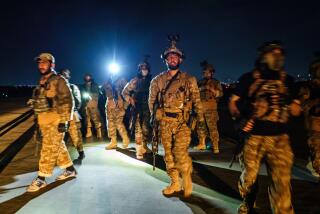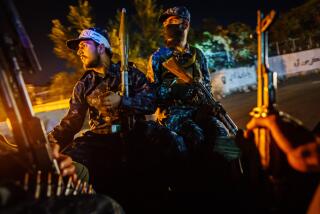U.S. Troops Must Not Be Palace Guards
Although Secretary of Defense Donald H. Rumsfeld did not know of any specific threats against Afghanistan President Hamid Karzai, the United States is nonetheless providing American soldiers for his security. According to Rumsfeld, this arrangement is supposed to be “short-term,” but he didn’t know “whether it’s weeks or months or several months.”
Given the state of affairs in Afghanistan, it’s not unrealistic to suppose that “several months” could turn into years.
The whole point of installing the Karzai government was to create a stable, representative, multiethnic government to replace the oppressive Taliban regime. Yet the current situation in Afghanistan can hardly be described as stable.
In February, Air Transportation and Tourism Minister Abdul Rahman was assassinated at the Kabul airport. Defense Minister Mohammed Qassim Fahim survived an apparent assassination attempt in April. And Vice President Haji Adbul Qadir was assassinated early this month.
Naturally, the immediate reaction was to demand more U.S. involvement in Afghanistan.
Sen. Charles Hagel (R-Neb.) believes that “we are going to have to take a look at ... more American involvement.” According to Sen. Bob Graham (D-Fla.), “We’re going to have to be more active in some of the security aspects.”
But more involvement--especially involvement that is a step toward nation-building--is exactly the wrong thing for the U.S. to do. And using U.S. military forces as bodyguards for Karzai is a step in the wrong direction.
There is already considerable friction over the U.S. military presence in Afghanistan, especially after the U.S. air attacks on several Pashtun villages this month. Ethnic Pashtuns, who make up nearly half the population, are showing signs of losing faith in Karzai--particularly his ability to protect the political interests and physical safety of his own ethnic group. Indeed, bringing in outsiders for protection has generally been an indication of an Afghan leader’s unpopularity.
Ultimately, U.S. troops acting as Karzai’s palace guard smacks of propping him up and reinforces perceptions that he is a U.S. puppet. This is a recipe for a disaster like the fall of the shah of Iran in 1979, not a prescription for a stable government.
More important, the national security of the United States does not require a stable, democratic, multiethnic, representative government in Afghanistan. Even if Afghanistan reverted to its traditional form of governance--a decentralized system with a nominal national government but with most power held by regional leaders--U.S. security interests demand only that whatever government is in power not provide haven and support for Al Qaeda terrorists.
If U.S. troops become a security force for Karzai and traditional rivalries between ethnic factions continue, the U.S. is likely to be drawn into Afghanistan’s internal power struggles (exactly what Washington seeks to avoid by not committing troops to the international peacekeeping effort), thus creating incentives and targets for terrorism.
In the end, it is impossible to keep an intervening party’s actions from altering the power calculations of all the rival factions. Invariably, the outside party will do something that is seen as benefiting one side’s interests at the expense of all others’. And the outside party then becomes a target for violence.
It will be a big mistake for the U.S.--originally seen as the liberator of Afghanistan from oppressive Taliban rule--if the Afghan people come to view the U.S. military presence as an invading and occupying military force. The U.S. military has better things to do than guard Karzai. Osama bin Laden is still at large. Al Qaeda and the Taliban have fled to neighboring Pakistan. If American blood is to be spilled, it should be against the perpetrators of the Sept. 11 attacks, not in taking a bullet for a foreign president.
More to Read
Get the L.A. Times Politics newsletter
Deeply reported insights into legislation, politics and policy from Sacramento, Washington and beyond. In your inbox three times per week.
You may occasionally receive promotional content from the Los Angeles Times.










